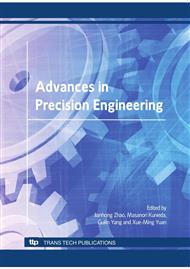p.366
p.371
p.376
p.381
p.386
p.391
p.396
p.401
p.406
Improving the Sensitivity of T-Shape Test to Friction Conditions for the Evaluation of Friction Behaviour in Microforming
Abstract:
In this paper, the sensitivity of T-Shape test to friction conditions was evaluated by observing the extrusion height and load curves throughout the normalized stroke (relative to workpiece diameter). Using the finite element code Deform 2D and assuming plane strain approximation, the effects of changing die geometry to the T-Shape test results were investigated. The sensitivity of the T-Shape test was also improved by introducing the double-sloped T-Shape design. The double-sloped T-Shape test was able to separate the extrusion height curves for shear coefficient of friction 0.0 to 0.4 which was unable to distinguish using the original T-Shape setup.
Info:
Periodical:
Pages:
386-390
Citation:
Online since:
September 2010
Authors:
Keywords:
Price:
Сopyright:
© 2010 Trans Tech Publications Ltd. All Rights Reserved
Share:
Citation:


